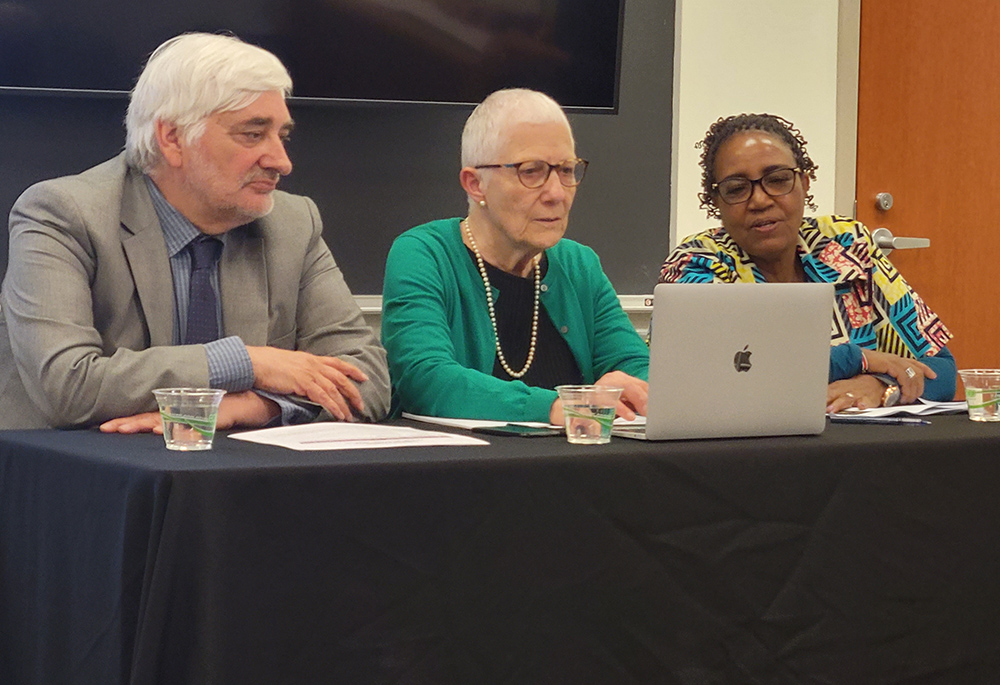
Speaking about nonviolence to mark the 60th anniversary of Pacem in Terris are (from left): Ken Butigan from DePaul University; Marie Dennis of the Catholic Nonviolence Initiative; and Loreto Sr. Teresia Wamuyu Wachira of St. Paul's University in Nairobi, Kenya. Wachira is also co-president of Pax Christi International. (NCR photo/Heidi Schlumpf)
Despite the violence that plagues the world today, an openness to gospel nonviolence is gaining ground, thanks in part to Pope Francis' example, said speakers on a webinar panel marking the 60th anniversary of Pacem in Terris, Pope John XXIII's encyclical on "Peace on Earth."
"We may be on the verge of an even deeper possibility of Jesus' nonviolence moving more from the margins of the church to its center," said Ken Butigan, a senior professional lecturer in the Peace, Justice and Conflict Studies Program at DePaul University in Chicago.
The webinar "Pacem in Terris at 60: Is the Catholic Church Heeding the Call to Gospel Nonviolence?" was sponsored by Pax Christi International and the Catholic Nonviolence Initiative, and was recorded April 19 at Catholic Theological Union in Chicago.
The panelists included Butigan; Loreto Sr. Teresia Wamuyu Wachira, co-president of Pax Christi International; and moderator Marie Dennis, senior program director of the Catholic Nonviolence Initiative.
Butigan traced the history of the 1963 encyclical, which was born in the aftermath of the Cuban missile crisis at a time of increased concerns about the nuclear arms race. He highlighted the influence of Italian nonviolence activist Lanza del Vasto, who underwent a 40-day fast to encourage the pope to make a statement on peace.
Butigan said Pacem in Terris reflects del Vasto's thoughts about "spiritual resistance," his term for active nonviolence. He believes the encyclical was not only a plea for nonviolent action that was born out of nonviolent action, but that it continues to be a form of "ongoing nonviolent action."
"Pacem in Terris gave new warrants for spiritually grounded nonviolent resistance, civil resistance, civil disobedience and what is called by some 'divine obedience,' " Butigan said. "It has helped radically transfigure an older notion of pacificism which was often limited to a traditional notion of 'nonresistance.' "
Advertisement
Wachira, who teaches peace and conflict studies at St. Paul's University in Nairobi, Kenya, stressed the urgent need for nonviolence on the continent. "In Africa there are babies who are born in war, live in war and die in war," she said. "They never experience peace."
But she shared stories of how nonviolence training, especially when paired with economic initiatives, can be successful. One student in her peace studies course admitted he was part of a militia group, but he eventually started an organization to help others leave lives of violence in such groups, she said.
"Young people are easy targets for militia groups in Africa," she said. "They often feel they have no other options but violence."
The panelists praised Francis for "relentlessly" calling for peace and nonviolence, including in his prayer intention for April. "We have learned so much from Pope Francis about nonviolence — both in word and deed — over this decade," said Butigan, specifically citing the powerful example of the pope kissing the feet of South Sudanese political leaders at a Vatican meeting in 2019, to urge them to maintain peace in their country.
In the question-and-answer portion of the webinar, attendees asked about the attitudes of young people in America.
"So many young people are hungry for an alternative to violence, not only in our city but in our world," said Butigan about his students. But he noted that they mistakenly believe that the only responses to violence are more violence or passivity, and said that training about "active nonviolence" is needed.
To a question about gun violence in the U.S., Dennis concluded, "Only nonviolence can address this culture of violence."





